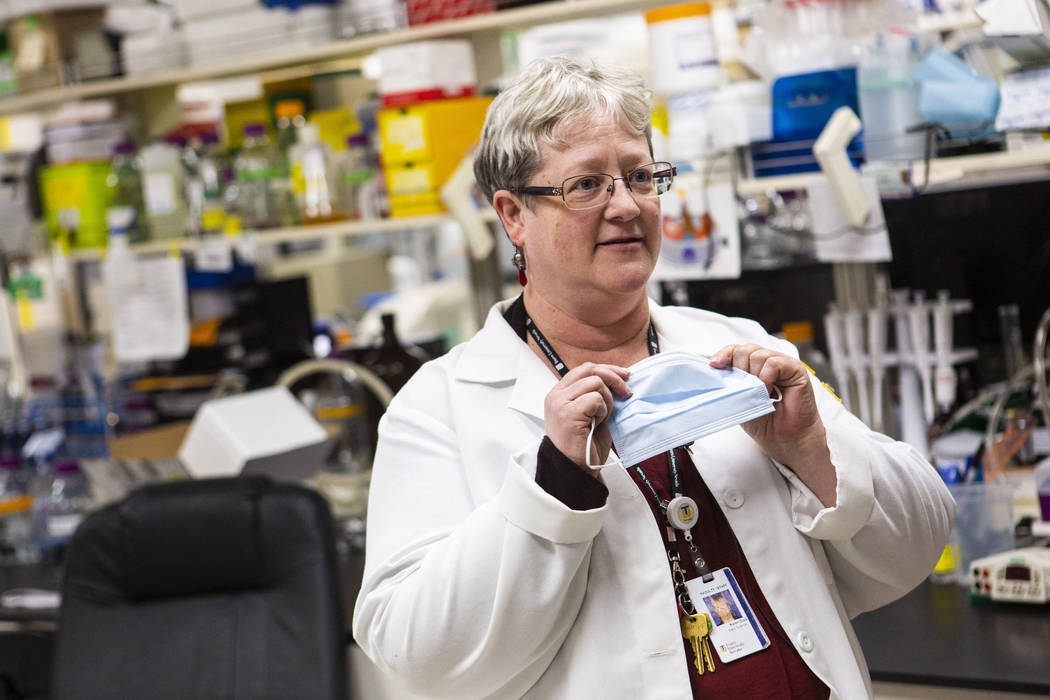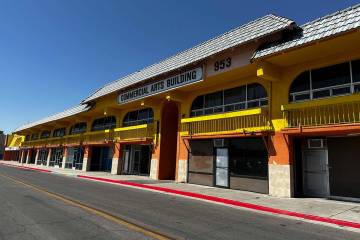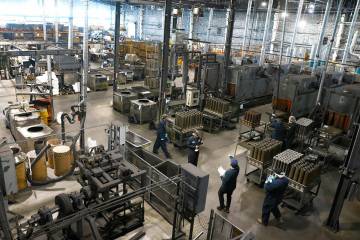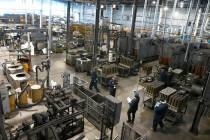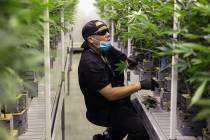Coronavirus affecting some businesses in Las Vegas Valley
While COVID-19 has yet to spread widely across the U.S., Las Vegas Valley businesses have said they’re starting to experience a supply chain disruption caused by the disease.
Henderson Hyundai General Sales Manager Gus Van Vlimmeren said the dealership had trouble receiving some of its top-selling car models for about three weeks. Hyundai Motor suspended production in South Korea following a shortage of supplies from materials it sources from China.
“That did affect us — just getting certain models like Palisade (and) Kona,” Van Vlimmeren said.
The effects were short-lived. Hyundai Motor said in an emailed statement Wednesday that all of its production facilities are in operation, and Van Vlimmeren said business at the dealership is back to normal.
But experts say this is likely the beginning of supply chain disruptions for many industries from the illness, caused by a variety of coronavirus.
‘Going to get worse’
The timing of the initial spread of COVID-19 — right around the start of Lunar New Year celebrations in January— might have lessened the initial hit on the global supply chain, according to Greg DeCroix, a professor in supply chain management for the University of Wisconsin-Madison.
He said companies often build up inventory prior to the holiday, and that softened the impact.
“On the other hand, some people who traveled during the holiday are not able to return to work due to travel restrictions,” DeCroix said. “This has even had an impact on companies outside of China.”
Since then, numerous industries have reported supply chain disruptions.
A report published Feb. 18 by analytics firm Windward found the number of vessels arriving or departing from Chinese ports has dropped 30 percent since the beginning of the year, “a clear anomaly compared with previous years’ trading patterns.”
Hitendra Chaturvedi, a professor of supply chain management at Arizona State University, said industries started to see an impact at the beginning of February. The industries hit worst are those that rely on Chinese manufacturing, such as the automotive, technology and apparel industries, he said.
But businesses that don’t rely on direct imports from China aren’t safe from the effects of COVID-19, according to Rudolf Leuschner, an associate professor of supply chain management at Rutgers University.
“If their direct materials don’t come from China but the parts do,” they will be affected, he said. “That effect is going to get worse for a while until everything sorts itself out.”
Doug Silva, owner and president of North Las Vegas-based Aerospace Machine and Supply, said his company solely uses U.S. materials and has still taken a hit.
Silva said he canceled a trip to an upcoming convention in Germany “strictly because of the virus” and had to stop sending sales reps to South Korea, home to some of his biggest customers. He said they can do some of the business over the phone, but it’s much less effective.
“Even if they speak the same language on the phone, it’s hard to understand,” he said. “It’s much easier in person, where you’re sitting across the table. … You always have to be in front of your customer. You have to know what’s going on in the market.”
If the outbreak worsens, it could be too much for some small businesses to stay afloat, Chaturvedi said.
“My concern is smaller businesses that rely completely on Chinese manufacturers,” he said. “They may be out of business … (if) they don’t have an inventory cushion or working capital to buy a lot more inventory as a future mitigation problem.”
More than 82,000 cases of COVID-19 have been reported globally, but only 15 people have contracted the virus in the United States. Another 45 cases involve Americans who were repatriated after contracting the disease abroad.
Consumer pains
It may not be long before consumers notice the effects of the illness on supply chains.
DeCroix said some companies may offer fewer discounts or sales if supplies are short. Leuschner said other businesses concerned about running out of inventory could bump prices to slow demand.
“The worst thing that could happen is you run out of inventory completely,” he said, because finding another source “may or may not be possible.”
Chaturvedi said “I pray” that rising prices “is just a short-term issue and the demand increase price drops down and doesn’t lead to full inflation.”
And while Leuschner said the virus will have less of an impact on a hospitality-focused market such as Las Vegas, Chaturvedi said he would be “absolutely surprised” if the city’s economy is not impacted in the short term.
According to Las Vegas Convention and Visitors Authority data, 20 percent of the city’s visitors in 2018 were from foreign countries, and 4 percent of all international visitors that year were from China.
“When data comes out, I’m forecasting that their (visitation) numbers will be down, way down,” Chaturvedi said. “In another month or so, this is going to become a bigger problem if you don’t fix this.”
Short-term impact?
Silva said he’s convinced the impact of COVID-19 will be short-lived.
“When it clears up, (our business) will push back up because we have to get caught up,” he said. “For the aerospace industry as a whole, it’ll hurt. … (But) the virus is a very short-term hit.”
But Leuschner said he expects the effects will get worse before they sort themselves out.
“Whether there’s a (major U.S.) outbreak or not, we’re going to feel the effect,” he said. “The supply chains in today’s world are all interconnected, and a lot begins in China.”
Leuschner pointed to container ships in China that are already being idled because there’s “no goods to transport, no people to move them, no factory workers.”
Even if companies run extra ships once production starts up again, he expects to see a delay in shipments because there are only so many ports that can accept the goods at once.
In terms of how long the supply chain disruptions last, Leuschner said, “We’re not talking about weeks. We’re talking about months.”
In the meantime, Chaturvedi urged businesses and consumers to take it day by day and not panic.
That would “do more harm than the coronavirus,” he said. “Preparing for the worst and hoping for the best is the best thing to do. … (But) if this problem is not solved by the end of March, I think it’s going to become even more acute.”
Contact Bailey Schulz at bschulz@reviewjournal.com or 702-383-0233. Follow @bailey_schulz on Twitter. Review-Journal staff writer Subrina Hudson contributed to this report.



